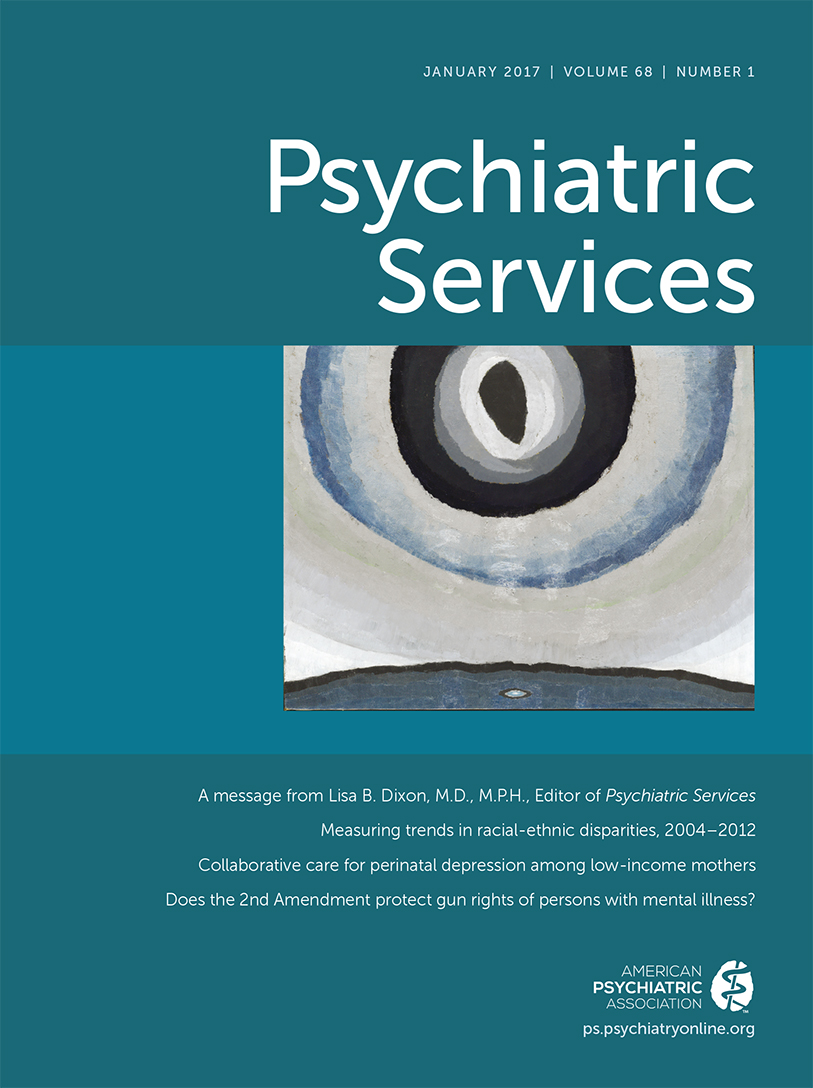To Readers of Psychiatric Services
I am thrilled to be the new editor of Psychiatric Services. I follow proudly in the footsteps of Howard Goldman and John Talbott. Both made major contributions to care delivery and the landscape of psychiatric services.
Howard Goldman was editor of Psychiatric Services for 13 years. He transformed the journal, enhancing its rigor. He understood the importance of maximizing internal and external validity in a field that sometimes forces challenging trade-offs requiring creative solutions. Howard also pushed the boundaries of the journal’s consideration of services to include services for children and for individuals with substance use disorders. He included articles and commentaries on the impact of social and ethical issues, such as stigma and coercion. In the issues published during his tenure, research articles reflect advances in implementation science, columns tell stories of new ideas in care delivery, and Open Forums present commentaries on controversial topics. Authors received thoughtful and respectful feedback from Howard, mindful of how much work it takes to write an article worthy of publication. Thank you, Howard, and I hope that my leadership similarly inspires the editor who will follow me.
Good services and good science—and perhaps good editing—pay attention to context. Therefore, I want to tell readers that I approach the role of editor within the context of my life and career path. I have spent 25 years conducting mental health services research, primarily focused on questions about the effectiveness and quality of care. I appreciate quantitative and qualitative methods and believe that developing new ideas and knowledge often requires transdisciplinary teamwork. An early mentor wisely advised me never to give up seeing patients, and I have a small clinical practice. I also oversee a training center in New York State that has helped me understand the challenges of clinicians and care providers and their supervisors’ supervisors. Sustaining good services requires financing and policy incentives, a lesson I learned from my research, practice, and training activities. Finally, my own experience with depression and family experience with schizophrenia inform my perspective. Psychiatric Services cannot be about them. The journal must be about us.
My vision for the journal will be this: Maintain rigor, enhance relevance.
Psychiatric Services must continue to be the premier scientific journal for understanding and improving behavioral health services and outcomes. Peer review of submitted manuscripts will continue to focus on the strength and appropriateness of study designs and their limitations. I will work hard with the publisher, the editorial board, the staff, and other groups to attract the best science to Psychiatric Services.
Beyond rigor, a key focus will be increasing the relevance of Psychiatric Services’ content. Relevance means “important to the matter at hand,” which is the current state of behavioral health care. I will ask authors and reviewers to consider how the content they submit and review matters today. What are the implications for what needs to be done today? Research often takes years to complete—starting with conceptualizing a study, obtaining funding, executing the study, and then finally writing up the results. Much research suffers from considerable time lags from inception to completion, requiring us to reconsider the implications of findings when they are published. The extensive time needed to complete research studies underscores the importance of our columns. Psychiatric Services publishes several popular columns, such as Law & Psychiatry, Best Practices, Integrated Care, and Economic Grand Rounds. Columns are shorter than standard research articles and do not have to follow a prescribed structure. Our column editors are a remarkable group of international leaders in their fields. I plan to develop some new columns—for example, Technology in Mental Health—and to help column editors be proactive by identifying critical issues that would benefit from scholarly, reflective essays. Relevance also requires encouraging different voices and perspectives to join our conversation.
Finally, I want to position Psychiatric Services to take advantage of digital possibilities that will increase its relevance and reach. We seek knowledge in new ways, and knowledge finds us in new ways. We will work hard to develop and enhance strategies to connect information and insights in the journal to the complex Web of communication that we join each day via our phones and tablets.
I want Psychiatric Services to be a force to make the world a better and healthier place for individuals experiencing behavioral health challenges by enhancing what we know, debunking what we think is true but isn’t, and inspiring conversation. I welcome your e-mails ([email protected]).



